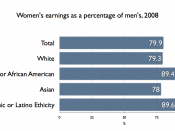Gender issues have become a great concern to many in the last century. Gender inequality issues and feminism have been on the rise and have become a topic of discussion at many world forums and meetings. In the article Development and Geography: gendered subjects in development processes and interventions, Sarah A. Radcliffe discusses the subject of development and its affect on gender and feminism. She breaks down her article into three main issues of concern; Development as intervention, Development as the subject of feminism, and gendered analysis of development processes and interventions.
To begin, Radcliff (2006) describes the idea of development as intervention stating that mainstreaming has become a popular means for ensuring that the issue of gender inequality is commonly discussed issue among governments, NGOs and international activities. Mainstreaming removes the idea of gender and development from a micro level and thrusts it into a macro level where it can be dealt with on an international, broader scale (p.525).
For example the issue of womenÃÂs equality and gender rights as well as the right of the female child to an equal education have become common discussion issues at places such as the World Social Forum (lecture, Jan. 29). However, mainstreaming has proved to have a downside because implementing it has shown to be uneven and space-specific due to differential investment and commitment abilities. Furthermore, mainstreaming has begun to normalize gender issues in a way that would lead one to think that gender issues are the same across the globe.
Radcliffe (2006) also brings attention to the fact that as mainstreaming occurs, there is an increase in the ÃÂmultiple masculinities in development contexts, in analysis and in specific interventionsÃÂ (p. 525). This raises the concern for gendered politics because if there is a strong ÃÂmasculinisedÃÂ (p.525), then public, economic and...


